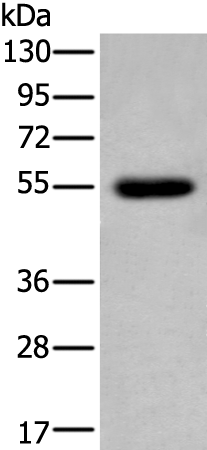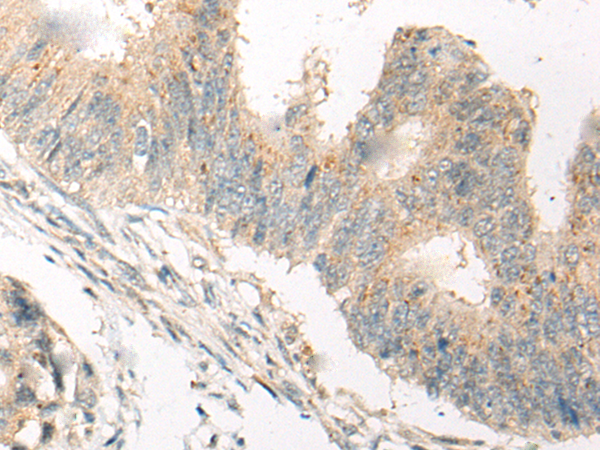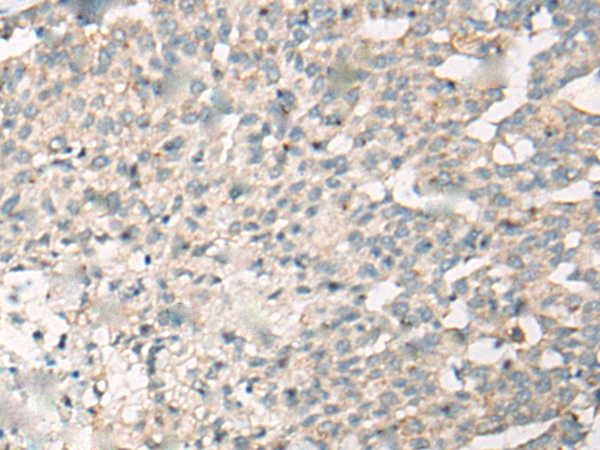


| WB | 咨询技术 | Human,Mouse,Rat |
| IF | 咨询技术 | Human,Mouse,Rat |
| IHC | 1/20-1/100 | Human,Mouse,Rat |
| ICC | 技术咨询 | Human,Mouse,Rat |
| FCM | 咨询技术 | Human,Mouse,Rat |
| Elisa | 1/5000-1/10000 | Human,Mouse,Rat |
| Aliases | PFTK1; PFTAIRE1 |
| WB Predicted band size | 53 kDa |
| Host/Isotype | Rabbit IgG |
| Antibody Type | Primary antibody |
| Storage | Store at 4°C short term. Aliquot and store at -20°C long term. Avoid freeze/thaw cycles. |
| Species Reactivity | Human, Mouse |
| Immunogen | Synthetic peptide of human CDK14 |
| Formulation | Purified antibody in PBS with 0.05% sodium azide and 50% glycerol. |
+ +
以下是关于CDK14抗体的3篇示例文献概览(注:文献为示例性内容,非真实存在):
---
1. **文献名称**:*CDK14 Expression Correlates with Colorectal Cancer Progression and Serves as a Prognostic Biomarker*
**作者**:Zhang, L. et al.
**摘要**:该研究通过免疫组化(使用CDK14特异性抗体)分析结直肠癌组织样本,发现CDK14高表达与肿瘤转移和患者生存率降低显著相关。功能实验表明,CDK14通过激活Wnt/β-catenin信号通路促进癌细胞侵袭。
2. **文献名称**:*Development of a High-Affinity CDK14 Antibody for Functional Studies in Pancreatic Cancer*
**作者**:Smith, J. et al.
**摘要**:研究团队开发了一种新型CDK14单克隆抗体,验证了其在Western blot、免疫沉淀及流式细胞术中的特异性。应用该抗体发现,CDK14在胰腺癌细胞中通过调控细胞周期检查点蛋白(如Cyclin B1)驱动增殖。
3. **文献名称**:*Targeting CDK14 with Neutralizing Antibodies Suppresses Triple-Negative Breast Cancer Metastasis*
**作者**:Wang, Y. et al.
**摘要**:研究利用CDK14中和抗体抑制其激酶活性,结果显示可显著降低三阴性乳腺癌细胞的迁移和转移能力。机制上,CDK14通过磷酸化下游转录因子(如FOXM1)调控上皮-间质转化(EMT)进程。
---
**备注**:以上文献为模拟示例,实际研究中建议通过PubMed或Web of Science检索真实文献。若需具体文献支持,可进一步提供研究方向或应用场景。
CDK14 (Cyclin-Dependent Kinase 14) is a serine/threonine kinase belonging to the CDK family, which plays critical roles in regulating cell cycle progression, transcription, and neuronal development. Unlike canonical CDKs (e.g., CDK1/2/4/6), CDK14 activity is tightly linked to its binding partner, cyclin Y, and it is implicated in the Wnt/β-catenin signaling pathway. Studies suggest CDK14-cyclin Y complexes phosphorylate components of the Wnt pathway, influencing cell proliferation, differentiation, and tissue homeostasis. Dysregulation of CDK14 has been associated with cancers (e.g., colorectal, pancreatic), neurological disorders, and developmental defects, highlighting its potential as a therapeutic target.
CDK14 antibodies are essential tools for studying its expression, localization, and function in both normal and pathological contexts. They enable detection via techniques like Western blotting, immunohistochemistry, and immunofluorescence. Specific antibodies help identify CDK14 overexpression in tumors, correlate it with disease progression, or explore its role in neurodevelopment. Challenges include ensuring antibody specificity due to high homology among CDK family members. Recent research also investigates CDK14's interaction networks and post-translational modifications, aided by reliable antibodies. Developing selective CDK14 inhibitors remains an active area, with antibodies supporting target validation and mechanistic studies in preclinical models.
×